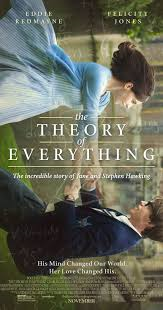 Smart, sweet and simple, The Theory of Everything captures the poignancy of famous astrophysicist Stephen Hawking’s inspiring story without appearing mawkish or melodramatic.
Smart, sweet and simple, The Theory of Everything captures the poignancy of famous astrophysicist Stephen Hawking’s inspiring story without appearing mawkish or melodramatic.
The Theory of Everything portrays Hawking during his descent from the peak of his health to a physically weak and dependent state due to a neurodegenerative disorder called amyotrophic lateral sclerosis (ALS). All the while, the brilliant astrophysicist, with his devoted wife Jane at his side, continues to harbor a passionate grit and scientific ideas that would shake the world.
By delving into the character of Stephen’s first wife Jane, The Theory of Everything provides a fresh, previously overlooked point of view on Stephen Hawking’s life.
Additionally, the film only briefly touches upon Hawking’s scientific work and, instead, focuses on the humans behind the theories. This human quality to the story makes Hawking more accessible and relatable to viewers while making the film, as a whole, more engaging to the majority of audience members.
For those who come into the theaters, looking for a better understanding of Hawking’s theories and achievements, this film will be a letdown. However, viewers will be able to get to know Hawkings on a more intimate level, despite the regrettably sparse background given on Hawking’s rise to professional success and fame. The movie, therefore, avoids becoming intimidating and, instead, forms a smooth, frictionless narrative, especially for a story focused on an astrophysicist.
Director James Marsh handles Hawking’s story carefully and delicately, even adding hints of humor to give viewers some breathing room. The film also boasts strong visuals, especially in its work with lighting. For example, the translucent lighting used early in the film adds a dreamlike sweetness to Hawking’s courtship of Jane.
The Theory of Everything also asks heavy questions about the existence of God and the beginning and end of time, but doesn’t force answers in viewers’ faces. Instead, the movie leaves room for an ambiguity that lives up to the film’s equally ambiguous title, making it more interesting and thought-provoking.
Hawking claims black holes temporarily capture energy, which is then released as radiation. Likewise, in his portrayal of Hawking, Eddie Redmayne captures viewers’ attention and then radiates energy. Redmayne is charmingly awkward and witty, and effectively portrays Stephen Hawking’s progressive physical deterioration. He exudes emotions from joy to love to pain, effortlessly communicating Hawking’s emotions to viewers, even when he is eventually limited to only moving his eyes.
Redmayne is able to portray Hawking with all of his emotions, strengths and weaknesses, thereby crafting a wonderfully flawed character. He, therefore, outshines Felicity Jones in her portrayal of Jane as she fades on screen, appearing unnaturally saint-like.
The Theory of Everything, although at times predictable, formulaic and misleading by glossing over the reality of Hawking’s true, off-screen life, is deeply evocative as it focuses on the human aspects of Hawking’s story and is led by the talented Eddie Redmayne.
My conclusion: 8/10

































![AI in films like "The Brutalist" is convenient, but shouldn’t take priority [opinion]](https://hilite.org/wp-content/uploads/2025/02/catherine-cover-1200x471.jpg)









































![Review: “The Immortal Soul Salvage Yard:” A criminally underrated poetry collection [MUSE]](https://hilite.org/wp-content/uploads/2025/03/71cju6TvqmL._AC_UF10001000_QL80_.jpg)
![Review: "Dog Man" is Unapologetically Chaotic [MUSE]](https://hilite.org/wp-content/uploads/2025/03/dogman-1200x700.jpg)
![Review: "Ne Zha 2": The WeChat family reunion I didn’t know I needed [MUSE]](https://hilite.org/wp-content/uploads/2025/03/unnamed-4.png)
![Review in Print: Maripaz Villar brings a delightfully unique style to the world of WEBTOON [MUSE]](https://hilite.org/wp-content/uploads/2023/12/maripazcover-1200x960.jpg)
![Review: “The Sword of Kaigen” is a masterpiece [MUSE]](https://hilite.org/wp-content/uploads/2023/11/Screenshot-2023-11-26-201051.png)
![Review: Gateron Oil Kings, great linear switches, okay price [MUSE]](https://hilite.org/wp-content/uploads/2023/11/Screenshot-2023-11-26-200553.png)
![Review: “A Haunting in Venice” is a significant improvement from other Agatha Christie adaptations [MUSE]](https://hilite.org/wp-content/uploads/2023/11/e7ee2938a6d422669771bce6d8088521.jpg)
![Review: A Thanksgiving story from elementary school, still just as interesting [MUSE]](https://hilite.org/wp-content/uploads/2023/11/Screenshot-2023-11-26-195514-987x1200.png)
![Review: "When I Fly Towards You", cute, uplifting youth drama [MUSE]](https://hilite.org/wp-content/uploads/2023/09/When-I-Fly-Towards-You-Chinese-drama.png)
![Postcards from Muse: Hawaii Travel Diary [MUSE]](https://hilite.org/wp-content/uploads/2023/09/My-project-1-1200x1200.jpg)
![Review: "Ladybug & Cat Noir: The Movie," departure from original show [MUSE]](https://hilite.org/wp-content/uploads/2023/09/Ladybug__Cat_Noir_-_The_Movie_poster.jpg)
![Review in Print: "Hidden Love" is the cute, uplifting drama everyone needs [MUSE]](https://hilite.org/wp-content/uploads/2023/09/hiddenlovecover-e1693597208225-1030x1200.png)
![Review in Print: "Heartstopper" is the heartwarming queer romance we all need [MUSE]](https://hilite.org/wp-content/uploads/2023/08/museheartstoppercover-1200x654.png)




